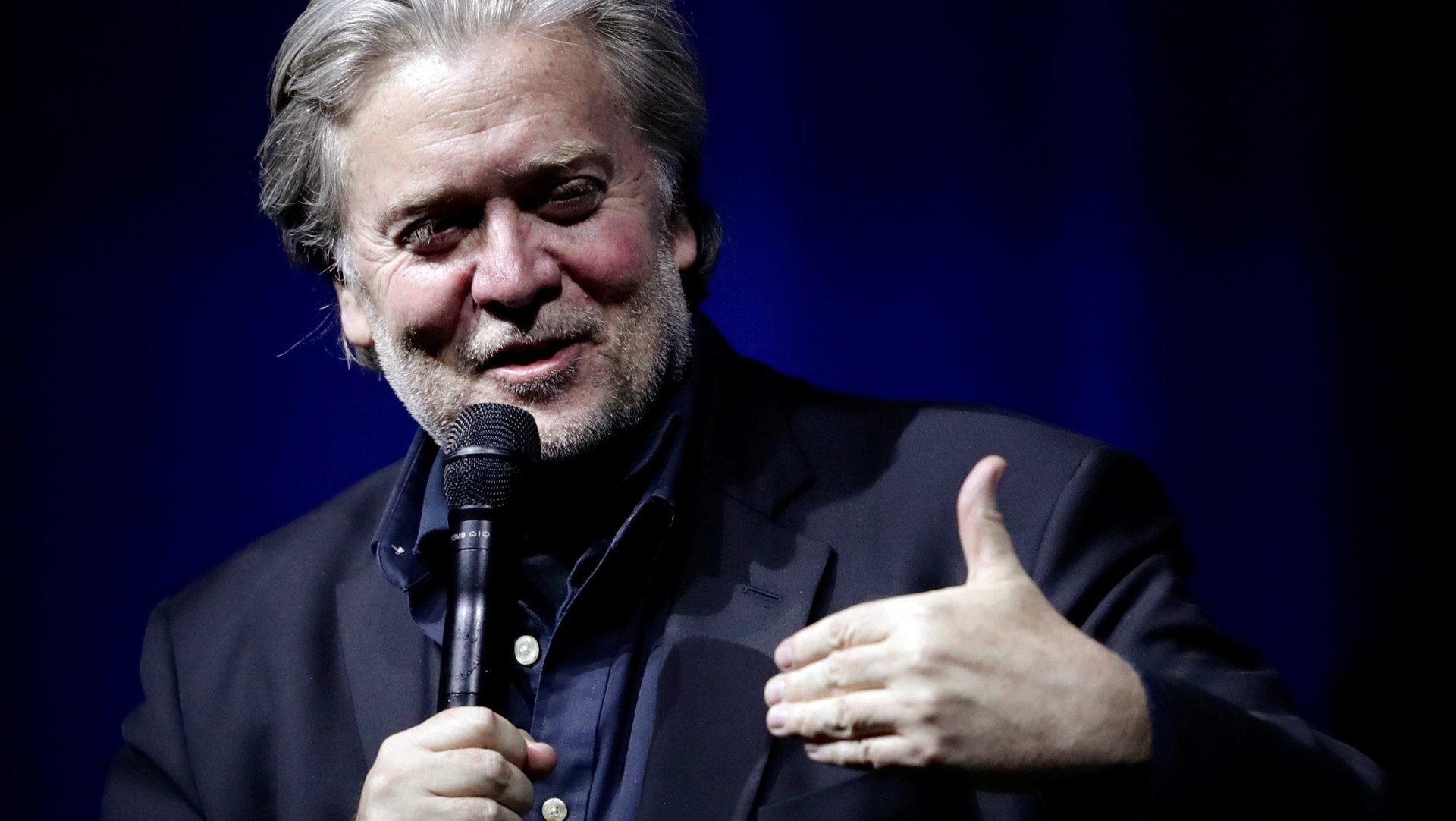Oxford Analytica wants to be very clear—it has nothing to do with that other company everyone is talking about
Former Donald Trump advisor Steve Bannon claims he came up with the name “Cambridge Analytica” for the data firm at the center of the largest scandal at the intersection of politics and business in recent years. During a Financial Times conference on Thursday, Bannon, who co-founded the company, called it “a stroke of genius.” But a 43-year-old Oxford-based consulting firm with big name corporations and governments as clients would beg to differ.


Former Donald Trump advisor Steve Bannon claims he came up with the name “Cambridge Analytica” for the data firm at the center of the largest scandal at the intersection of politics and business in recent years. During a Financial Times conference on Thursday, Bannon, who co-founded the company, called it “a stroke of genius.” But a 43-year-old Oxford-based consulting firm with big name corporations and governments as clients would beg to differ.
“Bannon’s comments are rather baffling,” David K. Young, the global managing director of Oxford Analytica, told Quartz. “It appears that Bannon simply copied our name, as Oxford Analytica was founded in 1975, 38 years before the ‘stroke of genius’ he claims.” Young said his company never dealt with Bannon.
Becoming somewhat of a collateral victim of the debacle, Oxford Analytica wants to be very clear that the two companies have nothing in common, aside from the name. There is “absolutely no relationship between Cambridge Analytica and Oxford Analytica,” Young said. The firm felt compelled to put out a statement earlier this week emphasizing that not only were the two companies not connected, they are involved in a legal dispute over their names.
“Brands can disappear or be damaged overnight, and we wanted to be as proactive as possible,” Young said.
Named after two of the United Kingdom’s most famed universities, the two firms have been confused in the past. In late 2016, after Cambridge Analytica started making waves as a player in the Trump campaign, Young became aware of the company. In 2017, Oxford Analytica launched a dispute in UK and EU privacy courts over the use of the word “Analytica,” which the older company trademarked in 1994. It originates from a title of Aristotle’s treatise on logic.
Cambridge Analytica did not respond to a request for comment.
Oxford Analytica was founded by the current global managing director’s father, David R. Young, who moved to Oxford to pursue a PhD from the US, where he was a lawyer for the Richard Nixon administration, working as an aide to Henry Kissinger. He was also one of the so-called “plumbers,” a White House team that was tasked with stopping leaks and doing dirty work like breaking into the office of the psychiatrist of Daniel Ellsberg, the Pentagon Papers leaker, and later, Watergate. In 1984, The New York Times described Young’s UK venture:
“Almost as soon as he came back to Oxford, it occurred to him that professors here, unlike those at comparable universities in the United States, did little consulting work for private industry. He saw them as ‘an underused asset,’ and out of his observation grew the company that he calls Oxford Analytica.”
The article describes the creation of Oxford Analytica’s Daily Brief, modeled on a briefing each US president gets on a daily basis. Oxford Analytica’s brief, pioneering at the time, since it was sent out electronically, functions to this day, as a subscription product that includes article-length analyses and executive summaries on political and economic trends and developments.
The firm, which also does strategy consulting and organizes events, works with big global players in both the business world and the public sphere, including Microsoft, NASA, law firm Hogan Lovells, and Commerzbank. Young would not say which governments the company works with other than the world’s “largest.” Oxford Analytica has no formal ties to the university itself.
The core company, whose main offices are in Oxford, New York and Washington DC is about 50-60 people, but it works with a large network of outside experts. Young said its competitors include Stratfor and IHS Markit, as well as the big consulting firms and some security companies. What the firm does not do, he emphasized, was crisis management or strategic communications.
Young said that “to his knowledge” there was no overlap between Oxford Analytica and Cambridge Analytica. One is a family-run-and-owned business, while the other, an offshoot of the larger SCL Group, is funded in part from the deep pockets of the Mercer family. One was founded in 1975, the other in 2013.
“We offer qualitative and economic analysis of geopolitical issues, based on robust analysis from experts,” he said. “Cambridge Analytica uses a very different methodology, using algorithms, data mining, and behavioral science, all combined with strategic communications across political and business spheres.”
“We’ve built over four decades a decent brand that is known for trust and objectivity and authoritative insight, and that was another reason to make sure we weren’t associated with Cambridge Analytica. Because you’re hearing what has been allegedly done,” Young said.